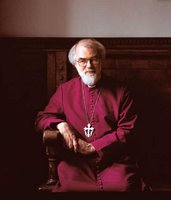Canterbury & Rome.

From another angle, if the Pope asked you why you persisted in remaining an Anglican, what would you say to him?
I’d say that I don’t believe the essential theological structure of the Church is pyramidal: that it has one absolute touchstone embodied in a single office. I’m certainly prepared to believe that there’s a role for the Petrine ministry of conciliation, interpretation, and mediation in the Church. I don’t see that as an executive centre; so I’d start from what would historically be called a conciliarist position. And the thing that always held me back from becoming a Roman Catholic at the points when I thought about it is that I can’t quite swallow papal infallibility. I have visions of saying to Pope Benedict: “I don’t believe you’re infallible” — I hope it doesn’t come to that. [Laughs] That’s how I’d answer, I think: that I’m wary of loading too much on to an individual office.That’s why you’re not a Roman Catholic. Why are you an Anglican?
I’m an Anglican because this is — it’s what I learnt in Sunday school, really — this is the Church Catholic in this place, gathered around the word and the sacrament, exercising a canonically continuous, recognisable form of the threefold ministry, structurally slotting in with how Catholic Christianity works.If you were starting from scratch, do you think the Anglican model works better than the Roman one?
Pwff! — by what imaginable standards would you answer that, I wonder? I don’t know, but the argument I’d give, I think, is not unrelated to what Vincent Donovan says in his book Christianity Rediscovered, responding to mission in East Africa, where he says, in a sense, you’ve got to let Churches grow out of their local setting, discover the need for recognisability, and build outwards from that. He describes the process by which some of his converts in East Africa almost invented the idea of Catholic ministry for themselves, the idea that if this is the kind of community that we are, if this is what the eucharist means, then we need that to be recognisable, and we need to know that, when we travel, it’s the same Church that we belong to, gradually accumulating like that. I think that’s a bit more Anglican than someone saying, “We’ll decide from the centre what the shape will be.”

0 Comments:
Post a Comment
<< Home